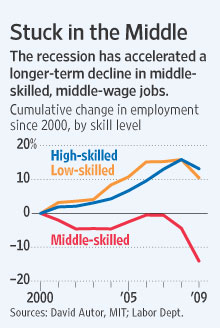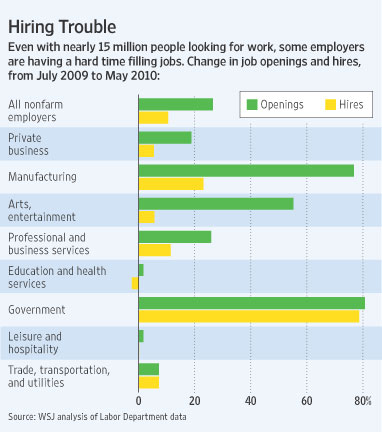justbehappy
Active Member
Some Firms Struggle to Hire Despite High Unemployment
some-firms-struggle-to-hire-despite-high-unemployment: Personal Finance News from Yahoo! Finance
some-firms-struggle-to-hire-despite-high-unemployment: Personal Finance News from Yahoo! Finance
In Bloomington, Ill., machine shop Mechanical Devices can't find the workers it needs to handle a sharp jump in business. Job fairs run by airline Emirates attract fewer applicants in the U.S. than in other countries. Truck-stop operator Pilot Flying J says job postings don't elicit many more applicants than they did when the unemployment rate was below 5%.
More from WSJ.com:
Slideshow: Tough Work, Not Many Takers
Interactive Graphic: The Long-Term Unemployed
Faces--and Fates--of the Jobless
With a 9.5% jobless rate and some 15 million Americans looking for work, many employers are inundated with applicants. But a surprising number say they are getting an underwhelming response, and many are having trouble filling open positions.
[Click here to find an online degree program]
"This is as bad now as at the height of business back in the 1990s," says Dan Cunningham, chief executive of the Long-Stanton Manufacturing Co., a maker of stamped-metal parts in West Chester, Ohio, that has been struggling to hire a few toolmakers. "It's bizarre. We are just not getting applicants."
Employers and economists point to several explanations. Extending jobless benefits to 99 weeks gives the unemployed less incentive to search out new work. Millions of homeowners are unable to move for a job because the real-estate collapse leaves them owing more on their homes than they are worth.
The job market itself also has changed. During the crisis, companies slashed millions of middle-skill, middle-wage jobs. That has created a glut of people who can't qualify for highly skilled jobs but have a hard time adjusting to low-pay, unskilled work like the food servers that Pilot Flying J seeks for its truck stops.
The difficulty finding workers limits the economy's ability to grow. It is particularly troubling at a time when 4.3% of the labor force has been out of work for more than six monthsa level much higher than after any other recession since 1948.
Some economists fear the U.S. could end up with a permanent caste of long-term unemployed, like those that weigh on government budgets in some European countries. "It is a very worrisome development," says Steven Davis, an economist at the University of Chicago's Booth School of Business. "It leads over a long period of time to social alienation as well as economic hardship."
[See U.S. Cities With the Strongest Job Markets]
Matching people with available jobs is always difficult after a recession as the economy remakes itself. But Labor Department data suggest the disconnect is particularly acute this time around. Since the economy bottomed out in mid-2009, the number of job openings has risen more than twice as fast as actual hires, a gap that didn't appear until much later in the last recovery. The disparity is most notable in manufacturing, which has had among the biggest increases in openings. But it is also appearing in other areas, such as business services, education and health care.
If the job market were working normallythat is, if openings were getting filled as they usually dothe U.S. should have about five million more gainfully employed people than it does, estimates David Altig, research director at the Federal Reserve Bank of Atlanta. That would correspond to an unemployment rate of 6.8%, instead of 9.5%.
Of course, many jobs remain easy to fill. Companies offering middle-skilled jobs can be flooded with applicants. Laquita Stribling, a senior area vice president in Nashville for staffing firm Randstad, says she received several hundred applications for a branch manager job that might have attracted a few dozen candidates before the recession.
"The talent pool has swollen to the point where it's almost overwhelming," says Ms. Stribling.

But other employers with lots of applicants say the pool of qualified workers is small for specialized jobs. Carolyn Henn, head of hiring at environmental consultancy Apex Companies, says she recently received about 150 applications for an industrial hygienist job paying as much as $47,000 a year, which requires special certifications and expertise to oversee projects such as asbestos cleanups. That is about three times the amount she received for similar jobs before the recession. But she says the number of qualified applicantsabout fiveis less than she got before.
"We've always been looking for a needle in a haystack," she says. "There's still only one needle, but the haystack has gotten a lot bigger than it was before."
Longer-term trends are at play. For one, the U.S. education system hasn't been producing enough people with the highly specialized skills that many companies, particularly in manufacturing, require to keep driving productivity gains. "There are a lot of people who are unemployed, but those aren't necessarily the people employers are looking for," says David Autor, an economist at the Massachusetts Institute of Technology.
Manufacturers of high-precision products such as automobile and aircraft parts are in a particularly tough spot. Global competition keeps them from raising wages much. But they need workers with the combination of math skills, intuition and stamina required to operate the computer-controlled metalworking machines that now dominate the factory floor.
At Mechanical Devices, which supplies parts for earthmovers and other heavy equipment to manufacturers such as Caterpillar Inc., part owner Mark Sperry says he has been looking for $13-an-hour machinists since early this year. The lack of workers is "the key limitation to the growth of our business and to meeting our customers' expectations," says Mr. Sperry. He estimates the company could immediately boost sales by as much as 20% if it could find the 40 workers it needs.
Trips to several job fairs yielded almost nothing, so the company set up a 10-week training program to create its own machinists. Out of the first group of 24 trainees, 16 made it to graduation.
Mr. Sperry sees extended jobless benefits as one of the main culprits behind his company's hiring difficulties. Many of the applicants he saw at job fairs, he says, were just going through the motions so they could collect their unemployment checks.
[See 7 New Skills Every Worker Needs]
Some workers agree that unemployment benefits make them less likely to take whatever job comes along, particularly when those jobs don't pay much. Michael Hatchell, a 52-year-old mechanic in Lumberton, N.C., says he turned down more than a dozen offers during the 59 weeks he was unemployed, because they didn't pay more than the $450 a week he was collecting in benefits. One auto-parts store, he says, offered him $7.75 an hour, which amounts to only $310 a week for 40 hours.
"I was not going to put myself in a situation where I was making that small of a wage," says Mr. Hatchell. He has since found a better-paying job at a different auto-parts dealer.
Unemployment benefits, though, can't explain the whole problem. Researchers at the Federal Reserve have estimated that the benefits could account for between 0.4 and 1.7 percentage points of the unemployment rate. That doesn't cover the 2.7-percentage-point gap between the current jobless rate and what Mr. Altig's analysis of job openings suggests the rate should be.


